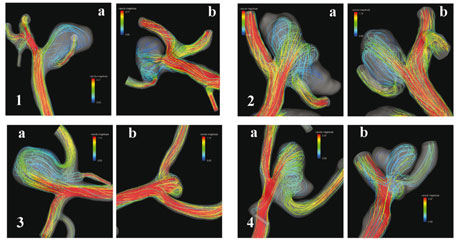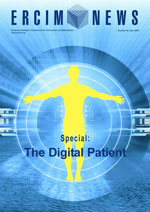by Alejandro F. Frangi, Aurelio Ruiz and Martin Hofmann-Apitius
The @neurIST project will develop a vertical and integrative approach to knowledge discovery, personalized risk assessment, patient guideline generation and treatment design. The project will have a big impact on the way that cerebral aneurysms are understood and handled and will provide a reusable and scalable approach to other diseases.
In common with almost every form of knowledge, the volume of data describing human disease processes, including their understanding, diagnosis and management, is growing exponentially. The data are increasingly heterogeneous in form, including textual, image and other symbolic structures. They are also hugely diverse in context, from global guidelines based on the broadest epidemiological studies, through knowledge gained from disease-specific scientific studies, both in vitro and in vivo, to individual patient-specific data.
The data also spans all length scales, from molecular, through cellular, to tissue, organ and patient representations. In recent years huge breakthroughs have occurred in the description of the human genome and in our understanding of its connection to disease processes through functional genomics studies.
The huge volume of this information and its rate of growth represent an unprecedented data management challenge. In particular it is often impossible for an individual, whether a clinician responsible for patient management, or a physicist or engineer developing a new generation of imaging or interventional devices, to understand and assimilate this knowledge. It is increasingly evident that new methods are required to manage, integrate and interrogate the data in a manner that is accessible to the end user.
Scalable and Reusable Concepts address a concrete Clinical Challenge
Although vertical integration across data structures and across length scales is the primary theme of this project, there is also horizontal integration at every level of abstraction, from access to information sources, evidence processing, knowledge representation, structuring and fusion. While for the purposes of this project and for obvious practical reasons the focus is on one (carefully selected) disease process, our aim is to create an integrative approach that is scalable and reusable for other disease processes. The chosen clinical application of this project is that of cerebral aneurysms and hemorrhagic stroke. While having an intrinsic importance due to its societal impact, this disease also has a number of interesting challenges that make it attractive as a proof of concept of the envisaged approach. Additionally, it is our belief that such a level of focus is necessary to credibly address the expected vertical integration and to identify clear exploitation paths. The latter exist both in industrial contexts (eg decision-support systems and advanced design of medical devices) and medical contexts, supporting further research and knowledge discovery (eg linking the molecular level of a disease with the disease process itself)

@neurIST is working towards:
-
developing a novel IT-enabled system for cerebral aneurysm management
-
identifying and collecting all publicly available, relevant and strategically important data for scientific studies
-
delivering a rich, multiscale information-processing chain that will provide new diagnostic indexes and insight into the process of aneurysm development and rupture
-
developing a set of scalable and reusable integrative suites and demonstrating their value for revolutionizing the understanding and management of cerebral aneurysm
-
providing an ICT-system for developing, integrating and sharing biomedical knowledge related to cerebral aneurysm as required by the integrative suites. The @neurIST infrastructure will not only support computationally demanding tasks such as complex modelling and simulation but will also enable access to health data distributed in public and protected databases distributed all over the world
-
inspiring and promoting the development of corresponding systems for other disease processes by demonstrating the personal and economic impact of IT-enabled information integration in the context of cerebral aneurysm management.
Although this Integrated Project is primarily concerned with vertical integration of biomedical data, many of the developed concepts have obvious implications and applications along the lines of the roadmap initiative STEP (A Strategy Towards the Europhysiome), which was funded as a concerted action in the same call as @neurIST. In particular it provides a platform for the demonstration of the benefits and viability of the "in silico model of a human being (virtual human) [merging] a top-down approach starting from the models of body parts and organs with a bottom-up approach that models molecular interactions, pathways and cells taking into account existing research activities." We believe that @neurIST is a pragmatic and concrete exemplar of the Virtual Physical Human concept as well as a transitional project from the Sixth to the Seventh Framework Programme.
Virtual Physiological Human for Cerebral Aneurysms
Current understanding of cerebrovascular aneurysm disease combined with modern imaging technology will increasingly reveal silent lesions as found during clinical exams. With a prevalence of 2-3% and a rupture risk in the order of 1/10 000 people annually, treatment of this disease would benefit significantly from an integrated approach and the development of a personalized risk assessment strategy. Integration of multiple clinical data and the use of Grid-based IST systems may provide a platform from which to tackle this problem. This will reduce health care costs by optimally targeting the relevant patient population, thus avoiding unnecessary and potentially risky interventions and improving methods of minimally invasive treatment.
Links:
http://www.aneurist.org
http://www.europhysiome.org
http://www.ninds.nih.gov/disorders/cerebral_aneurysm
http://www.bafound.org
Please contact:
Alejandro F. Frangi
Pompeu Fabra University, Barcelona, Spain
Tel: +34 93 542 1451
E-mail: alejandro.frangi![]() upf.edu
upf.edu










